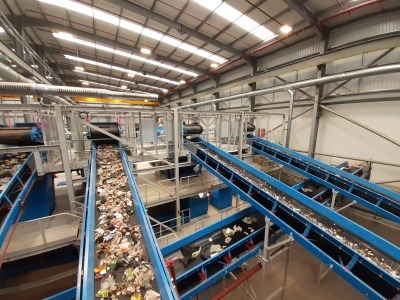Viridor commences Clyde Valley residual waste contract
Viridor’s residual materials recycling facility (rMRF) at Bargeddie in North Lanarkshire has begun to receive waste as part of a £700-million household waste contract with five Scottish councils.

The contract, which is central to the 25-year Clyde Valley Residual Waste Project, will see Viridor process up to 190,000 tonnes of residual waste annually from five local authorities, led by North Lanarkshire Council and including East Renfrewshire, East Dunbartonshire, Renfrewshire and North Ayrshire.
Residual black bag waste will be processed at the Bargeddie Hub, with recyclate extracted for further processing, whilst the remaining non-recyclable material will be transferred to Viridor’s energy recovery facility in Dunbar.
Steve Don, Viridor’s Head of Local Authority Contracts in Scotland, said: “The Bargeddie Hub is now receiving waste as part of this contract just in time for the very busy post-festive season period. The Clyde Valley Partnership is an excellent example of how local authorities can work together to deliver effective waste management and contribute to a circular economy in Scotland.
“The sophisticated technology at Bargeddie improves recycling and non-recyclable waste treatment, maximising the opportunities to recycle while putting non-recyclable waste to work to generate low carbon electricity.”
Andrew McPherson, Head of Regulatory Services and Waste Solutions at North Lanarkshire Council, added: “This announcement represents a landmark moment for the Clyde Valley Partnership. This sophisticated hub will help to dramatically reduce household waste going to landfill. Anything that is able to be recycled will be, with material that cannot [be recycled being] converted into low carbon energy.”
Robert Steenson, Executive Director of Enterprise and Communities at North Lanarkshire Council, commented: “This is a significant project for the five local authorities, both as the first partnership of its kind in Scotland and in its contribution to managing household waste more effectively.
“It means that the waste, which cannot otherwise be recycled, will now be diverted from landfill and transformed into low carbon electricity, with the Dunbar Energy Recovery Facility generating enough power for the equivalent of 70,656 homes. At the same time, it also reduces the overall carbon impact associated with the disposal of the waste.”
Scotland’s landfill ban
Scotland has made recent investments in its residual waste infrastructure as it prepares for the introduction of its ban on sending biodegradable waste to landfill, which has now been pushed back from 2021 to 2025.
The landfill ban forms part of the Scottish Zero Waste Plan, which aims to achieve a nationwide recycling rate of 70 per cent by 2050, with only five per cent of remaining waste going to landfill.
With figures revealing that Scotland’s recycling rate has fallen for the first time since 2011, dropping from 45.5 per cent in 2017 to 44.7 per cent in 2018, more than £33 million has been invested in the Viridor Bargeddie Recycling Hub with the aim of boosting Scotland’s recycling.
Steenson explained: “Viridor has invested in its plants at Bargeddie and Dunbar to ensure it has the latest technology to manage this contract and help the partner councils to comply with the Scottish Government’s Zero Waste Plan and Waste (Scotland) Regulations 2012.”







